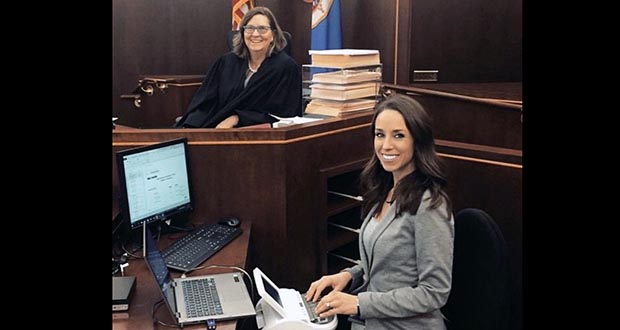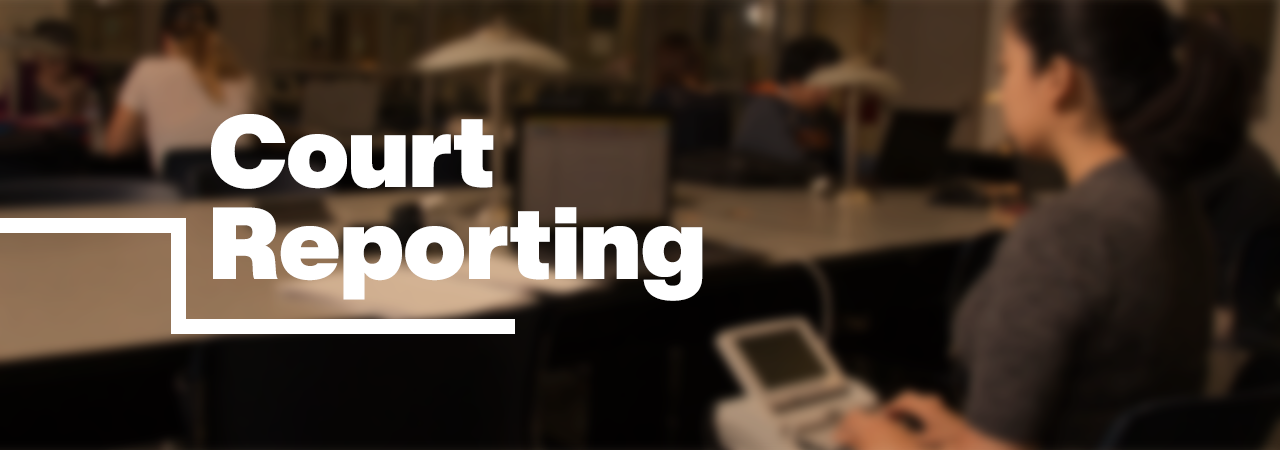Exactly How Court Reporting Works: A Step-by-Step Guide to the Lawful Process
Court reporting is a critical part of the legal system. It involves an organized procedure that guarantees exact documents of procedures. From preparation to the last shipment of records, each action is vital. Understanding exactly how stenotype reporter run offers understanding into the integrity of lawful documents. The nuances of their work can greatly influence lawful results, triggering questions concerning the techniques and innovations they utilize. What are the certain techniques that define this occupation?
The Function of Court Reporters in the Legal System
Stenotype reporter play a vital role in the lawful system by giving precise and trustworthy transcripts of court process. Their work warranties that every spoken word throughout hearings, depositions, and tests is recorded, which is important for maintaining a main document of events. This transcription is basic for appeals, as it permits greater courts to evaluate the process and identify if any kind of mistakes were made during the test.
Additionally, court press reporters aid in protecting the honesty of the lawful process by producing verbatim documents that can be described by lawyers, courts, and various other parties included in a situation. They often use specific devices and software to capture dialogue with accuracy. Past the court room, their records can act as essential historical papers, supplying understanding into judicial proceedings and the legal system's functioning. Eventually, stenotype reporter contribute substantially to openness and liability in lawful issues.
Preparing for a Court Reporting Session
Preparation is important for a successful court reporting session, as it ensures the precision and performance of the transcription procedure. Court press reporters begin by reviewing case materials, consisting of pleadings and witness listings, to familiarize themselves with the terminology and context. They additionally make specific that they have the necessary tools, such as steno equipments, note pads, and back-up devices, ready for use.
Prior to the session, communication with legal groups is vital. Press reporters often clarify any kind of details demands relating to format or favored terms. Furthermore, they may arrange to consult with witnesses or attorneys to discuss the proceedings and validate the timetable. Showing up early to establish the devices permits repairing prospective technical concerns. Generally, complete preparation not just improves the press reporter's self-confidence but additionally contributes greatly to creating a clear and accurate record of the lawful proceedings.

Recording the Record: Methods and Equipment
Making use of advanced methods and trusted equipment, stenotype reporter diligently capture the talked word throughout lawful proceedings. They employ stenography, a technique entailing a specialized equipment that allows them to type several audios concurrently, therefore recording discussion in real time. This device, referred to as a steno keyboard, is furnished with tricks that stand for words and syllables, making it possible for swift and precise input.
Along with stenography, court press reporters might make use of audio recording devices as additional tools. These gadgets offer as back-ups, making sure that no essential details is shed throughout process. Some press reporters include software application that improves their transcription efficiency, offering attributes such as voice acknowledgment and automated format.
Proper positioning and focus are extremely important; press reporters have to maintain focus on all audio speakers, catching nuances and inflections that add to the document. With a combination of ability and modern technology, stenotype reporter support the integrity of the lawful process by ensuring a exact and extensive record of occasions.
Transcribing the Process
Transcribing the proceedings needs court reporters to transform spoken discussion into created text with remarkable precision and speed. This procedure generally takes area right away after the recording has actually been captured, making use of specialized software that permits seamless transcription. Stenotype reporter must pay attention diligently to the audio, making sure that every word, pause, and inflection is properly represented in the transcript.
They usually rely upon shorthand systems, individual transcription abilities, and progressed technology to facilitate this job. The environment in which they work can be in some cases disorderly and busy, as lawful proceedings commonly entail multiple speakers and technical jargon. Court press reporters have to also maintain concentration to catch subtleties in tone and context that might be crucial for the legal record. Ultimately, the precision of the transcription is vital, as it offers as a certification for future referral in lawful process.
Reviewing and Editing the Transcript
The process of reviewing and editing and enhancing the records is essential for ensuring accuracy in court reporting. Court press reporters often collaborate with that site lawyers to make clear any kind of obscurities and verify the correctness of the recorded statements. This collaboration is crucial for keeping the honesty of the legal record.
Importance of Precision
Accuracy functions as Your Domain Name the cornerstone of reliable court reporting, as also minor mistakes can greatly change the meaning of lawful process. The evaluating and editing procedure is important in making sure that transcripts mirror the spoken word with fidelity. Court press reporters thoroughly confirm names, technological terms, and legal jargon to preserve precision. This focus to detail aids stop misunderstandings that can impact instance outcomes. Furthermore, precision fosters depend on among attorneys, customers, and the court, reinforcing the honesty of the judicial system. Errors can bring about disputes or charms, making it crucial for press reporters to fine-tune their job thoroughly. Eventually, the quest of precision not just improves the integrity of the records but likewise promotes the standards of the legal occupation.
Cooperation With Attorneys
Collaboration between stenotype reporter and lawyers is crucial during the examining and editing and enhancing stage of transcript production. This process guarantees that the final file properly mirrors the talked word and complies with legal standards. Attorneys typically examine records for certain terms, context, and any potential errors that could impact the case. Court press reporters rely upon lawyers' competence to clear up uncertain sections or highlight important declarations. Efficient communication is essential; attorneys may offer feedback or request corrections, which court reporters have to resolve without delay. This collaboration not just improves the quality of the transcript but also adds to a smoother lawful process. Ultimately, joint initiatives result in a reliable and exact document, necessary for legal proceedings and future referrals.
Providing the Final Records to Clients
Upon conclusion of the transcription procedure, stenotype reporter diligently prepare the last document for distribution to their clients. This last transcript undertakes complete proofreading to assure accuracy, as any kind of errors can significantly influence legal process. Court reporters layout the document according to the details demands established forth by the clients or lawful companies, including pagination, indexing, and any kind of required displays.

Finally, court press reporters might provide a cover letter summarizing crucial information and supplying more aid if required. This extensive method assurances that clients get a polished, accurate, and easily navigable records, crucial for their lawful demands.
Often Asked Concerns
What Certifications Are Needed to Become a Court Reporter?
To come to be a court press reporter, people usually need a secondary school diploma, conclusion of a court reporting program, and qualification or licensure, relying on state demands. durham court reporting. Proficiency in shorthand and technology is find more info additionally necessary for success
How much time Does It Require To Total Court Reporting Training?
Typically, finishing court reporting training takes in between 18 months to four years, relying on the program's intensity, the student's rate, and the particular requirements of the territory in which they wish to exercise.

What Is the Typical Income of a Court Press reporter?
The ordinary income of a court reporter differs by place and experience, generally varying from $45,000 to $100,000 yearly (durham court reporting). Variables such as expertise and need can greatly influence their profits in various regions
Are Court Reporters Required to Have Qualification?
Court reporters are commonly needed to get certification, which ensures they have the necessary skills and expertise for accurate transcription. Certification needs can differ by state or territory, reflecting professional requirements within the lawful area.
Can Court Reporters Work Remotely or Freelance?
Court reporters can work from another location or freelance, giving flexibility in their profession. Numerous use modern technology to record process from numerous locations, allowing for diverse opportunities in the legal field while preserving a work-life balance.
Court reporters play a necessary duty in the lawful system by supplying exact and trusted records of court process. In addition, court press reporters aid in protecting the stability of the legal process by creating verbatim documents that can be referred to by legal representatives, courts, and other parties involved in a case. Making use of innovative methods and dependable equipment, court reporters diligently record the talked word during lawful process. Court reporters should also keep concentration to capture subtleties in tone and context that may be vital for the legal document. To end up being a court reporter, individuals generally need a high school diploma, completion of a court reporting program, and accreditation or licensure, depending on state needs.